Greetings
Friends in the Name of Safety:
We're still here!
Safety Section UPDATE: As soon as we
know where things shake out, we'll let you
know. Thanks again for your continued
support!
Don't
Forget...We have had to cancel the
Atlantic Beach and Flat Rock APCAP programs
due to state budget constraints.
The Good
News Is... We are still having the NC Zoo,
Asheboro Basic & Advanced APCAP program
October 26-30, 2009 for Basic and October 26
& 27, 2009 for Advanced.
To register for either the Basic or
Advanced, please
CLICK HERE
(NOTE: In
order to attend the ADVANCED course, you
must have completed one of our BASIC
programs.)
80th Statewide Safety
Conference!
Mark your calendar now for
May 11-14,
2010! Eighty Years of Safety and
Counting...
|
Smithfield Basic APCAP
Class!
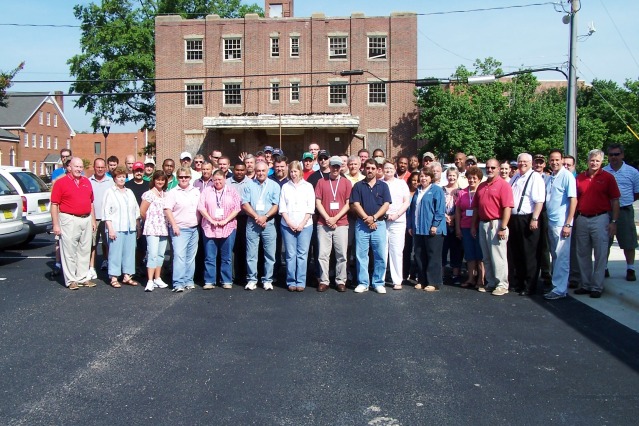
Join us in welcoming
our newest APCAP graduating class.
Our Smithfield Basic APCAP class was
a success and we look forward to
seeing you in October at the Zoo for
the Advanced course!
|
Regional Safety Councils
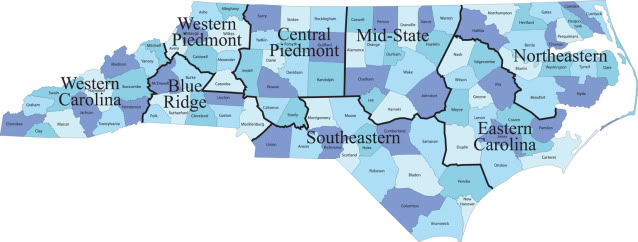
Please... don't forget to support your
Regional Safety Councils by joining
their membership ranks and participating
in their scheduled events. For
membership applications, see the Quick
Links to the right.
|
The Eastern
Carolina Safety Council
presented the Lifesaving Award
Recently...
At its July Quarterly meeting in
Greenville, Buster Dawson, ECSC
Chairman, presented the Lifesaving
Award to Judy Evans, Patricia
Richardson, Larrine Sharp, and
Yvonne Baines.
These ladies were responsible for
saving the life of a 14-month old
child through CPR efforts at
the Hattie Daniels Day Care Center
in Wilson, NC.
If you have a lifesaving
experience you believe would qualify for
this award, please contact your Regional
Safety Council for more information.
|
NCIC Video Library
Check out our
Video Library !
View our online
Video/DVD listings. The new listings are
in
RED.
To view the rest of our Library and
download the REQUEST FORM, please
CLICK HERE
|
Quickie Manufacturing Corp
in Lumberton Completes One
Year of the NCIC Accident
Prevention in the Workplace
Program
Pictured
L to R are Jon Hill, HR Director,
Michelle Springer, Safety,Environmental
and Training Manager, Dennis Parnell,
Director Safety Education, NCIC, Markus
Elliott, Safety Consultant, NCIC, and
Dave Dickson, Plant Manager, Quickie
Mfg. Last year, Quickie Manufacturing
initiated the Industrial Commission's
Accident Prevention in the Workplace (APW)
program. Since this program began, they
have seen their Workers' Comp claims
drop significantly and they contribute
this in part to the APW program.
For more information on this program,
please give Dennis a call at
919-218-3000 or email him at
Dennis.Parnell@ic.nc.gov.
|
|
Are You a
Volunteer?
By Michael Nance
I don't know about you but I
am getting tired of watching the news. When
I was growing up, the television (with all
three channels) was on around dinner time
with the news of the day. The newspaper we
received was a late afternoon delivery so
the television news was more up to date.
Remember, there wasn't Internet at the
time.
Here lately the news is saturated with
health care coverage, Michael Jackson's
death, political debates and of course, the
economy. By the time this goes to print,
something else might happen that gets
plastered all over the media. Don't get me
wrong, many topics are truly newsworthy; but
it's the repetitive nature of examining
every angle over and over again. Every once
in a while we hear of strange weather in
certain areas like the heat in Washington
and Oregon at the end of July. Perhaps we
hear that additional members of the military
were killed by a roadside bomb. Those
military folks volunteered to serve our
country.
The military injuries and fatalities bother
me the most. Not that I think the effects
of war should be glorified, but I do think
that we have become numb to the reports of
the wars and conflicts around the world. I
know that we all experience emotional times
when something happens to a friend or family
member, but it seems that unless it effects
someone close, we don't give it the
attention it deserves. Instead of bonding
together as a neighborhood, a state, or a
country; we tend to look through the eyes of
"how does it affect me" syndrome. Quite
frankly, it's a natural thing and hard not
to do at times.
Occasionally we hear a "good news" story of
how someone volunteered themselves to the
safety of another. Sometimes the identity
is not even known, but we hear about it
anyway. Remember the man that protected
another in a subway by jumping in and lying
on top of them? With events like 9/11 and
other huge tragedies there were un-named
people providing safety and help to folks
they've never seen before. They volunteered
themselves and in some cases, like the
military, lost their life in doing so.
In safety, we should focus on our own
protection but we should also pay attention
to co-workers and others that we come in
contact with on a daily basis. Simply
thinking to ourselves, "it's not my
problem", isn't a good attitude. Sadly, I
remember working with someone that had an
extreme case of "not my problem". It was a
tractor trailer accident where a lady had
been thrown from her vehicle and suffered
massive injuries and died at the scene on
the roadbed. Both drivers were deemed
partly responsible, but all the truck driver
could do or say was how dumb the other party
was. No feelings of sadness or sympathy. I
was shocked that someone could have no
emotion in such a terrible scene. I wasn't
even there and I felt extremely terrible.
Fortunately, other motorists stopped and
aided in keeping the condition from getting
worse. These motorists risked health
issues, delays in their schedule, etc. They
were concerned citizens about someone else's
safety.
They volunteered to stop and help.
Today I hear of unemployment reaching 21
percent close by down in South Carolina. I
know in many counties of North Carolina,
especially those in the textile and
furniture industries, unemployment has
reached record highs. At the same time, I
hear that even when donations are extremely
low, charities are still able to reach out
to those in need. In our workplace
environment, we have fears. Fueled by the
economy, we have a lot on our minds. If I
lose my job, what will I do with my mortgage
or car payment? How will I be able to
afford the things my kids need for school or
for college, gas for the car? The list goes
on. Several times my wife has mentioned to
me "we are lucky" in many ways, especially
when we hear of terrible news about a
friend, or when we read a story of
life-changing issues that folks face
everyday. "There's always somebody worse
off than you", she would say. In many of the
workplace environments I've been to, many
have volunteer campaigns to assist and aid
in the less fortunate. Everyone in the
company had volunteered in one way or
another.
Not long ago my daughter went through
confirmation at our church. It was a fairly
long, structured process lasting about 12
weeks. I happened to be involved as well,
being a mentor to another member of the
youth group. One of the suggestions in the
program was to participate in a community
event where your time and/or talents were
sacrificed to aid someone else. I
participated in the serving of dinner at the
Salvation Army. It's not rocket science,
but someone needs to be a server
nonetheless. I noticed a distinct
difference in the two groups that came for
food. The first group was from the shelter
itself. They had a roof over their head, a
place to watch television, a place to work
on finding a job, etc. When these folks
came through the line, many (in my opinion),
were a little picky. Do not misunderstand
me, they were experiencing harder times than
most, but the dinner was free. "Don't put
that on my plate" or "How fresh is it?" were
sample comments. The second group of folks
were truly homeless. Never mind
why,.....they were homeless. When they went
through the serving line, every one of them
asked for whatever we could serve. They
didn't care how fresh, how hot, or what it
was. They were hungry. The youth in the
group (along with the adults) came away with
a new respect in "what's for dinner".
Being a volunteer can open your eyes to
what's in front of the rose colored glasses.
Every year I hear of mentors needed in the
school system. We hear of youth groups going
out to local communities or foreign lands to
help build wheelchair ramps, paint a house
in serious need or share their faith with
others. One such community is called
Carolina Cross Connection. We hear of adults
bonding together to build a house for
Habitat for Humanity. In all of these
examples people come back and tell of life
changing attitudes, some influenced to the
extent of deciding careers paths to a life
of service.
The White House has launched a program
called "United We Stand", urging Americans
to volunteer in their local communities.
Governor Perdue supports this worthy effort
and has encouraged all state employees to
give of their time and talents. Local
opportunities can be found at www.serve.gov.
A few hours a week or month can make a
difference in someone else's life. Even
though money helps many organizations to
operate, usually personal time and
face-to-face assistance is the most valuable
and meaningful experience.
Just while writing this article I saw an
internet news flash about a five year old
girl in California that raised $30,000 to
help the hungry. Locally, Hope Stout, a
twelve year old girl that suffered from a
rare form of bone cancer was granted a wish
by the Charlotte Make-A-Wish Foundation.
Her wish was to grant the wishes of 155
children ahead of her. Funds were not
available and she decided to do something
about that. She was responsible for the
awareness and raised over one million
dollars in 30 days, allowing all wishes to
be granted. She died shortly after (January
4, 2004) but not before touching many, many
lives. Little known by many, her story is
to be made into a major film. The economy
has affected the film production but I hope
to one day watch the story on the big
screen. Let's change the news headlines
we've grown tired of hearing every day.
Wouldn't it be nice to hear 30 minutes of
good news? Not unlike a superior safety
program, it won't happen on its own or
overnight but it's got to start somewhere.
Let's Pay It Forward.
Editor's
note: Michael Nance is the NCIC Blue Ridge,
Southern & Western Piedmont areas Safety
Representative. If you are interested in
having one of our programs in your area,
please give Michael a call at 919-218-9047
or email him at Michael.Nance@ic.nc.gov
|
From the Desk of
Dennis Parnell
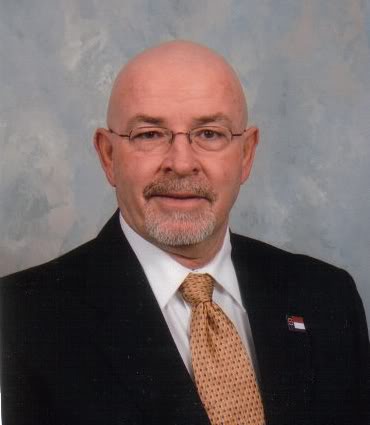
Director Safety Education
Start Planning for Fire Prevention Week!
For the past 87 years, the
National Fire Protection Association (NFPA)
has sponsored a fire prevention week to
raise awareness about fire safety. This
year, fire prevention week is scheduled for
Oct. 4-10, 2009, with the theme: Stay Fire
Smart! Don't Get Burned. According to NFPA,
U.S. fire departments responded to 399,000
home fires in 2007. These home fires killed
almost 2,900 people and accounted for 84
percent of all fire deaths.
The focus of this year's campaign is on ways
to prevent fires and the deaths, injuries,
and property loss they cause.
NFPA provides more information on it's
website at:
www.nfpa.org.
See Related
Article:
Keep the home fires extinguished -
August 2008
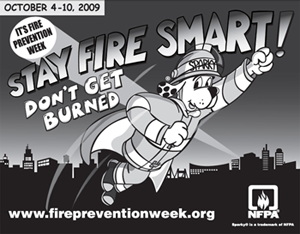
Now you know. Dennis :)
|
Insight!
Fun and useless tidbits

-
Phoebe Harrius was
convicted of coining false money, a
crime of high treason at that time, and
was executed by being burned at the
stake in front of Newgate Prison in
England, in 1786.
-
Charles Carroll was the
last of the 59 men who signed the
Declaration of Independence to die. He
passed away in 1832 at the age of 95.
-
Nicole Dunsdon, the last
Miss Canada, completed her reign in
October 1992. In 1991 women's groups had
successfully lobbied to have the Miss
Canada contest canceled, claiming it was
degrading to women.
- André-Jacques
Garnerin, 1797 --- 1st parachute jump.
Dropped from a balloon, about 6,500 ft.
over Monceau Park in Paris in a
23-ft.-diameter parachute made of white
canvas with a basket attached (Oct. 22).
- Count de Grisley,
1799 --- 1st magician to perform the
trick of sawing a woman in half .
- A recent study
indicates when men crave food, they tend
to crave fat and salt. When women crave
food, they tend to desire chocolate.
- Americans consumed
over 3.1 billion pounds of chocolate in
2001, which is almost half of the total
world's production.
|
Mid-State
Safety Council...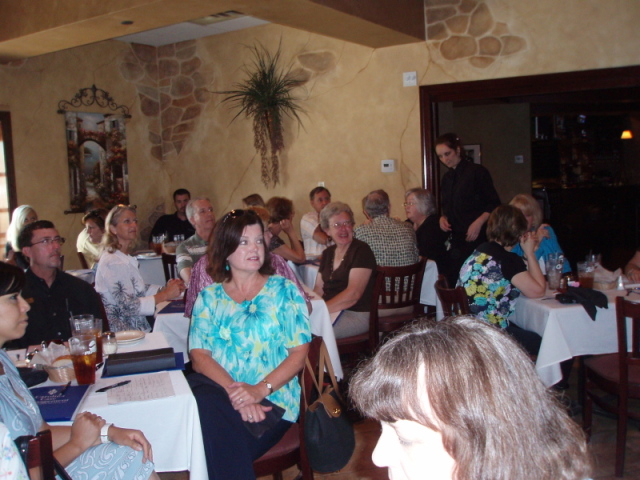
Attendees listen to
Allison Parker with Carolina Case
Management & Rehabilitation Services
discuss Workers' Comp issues at their
June Quarterly meeting. The lunch
meeting was held at Northside Italian
Chophouse in Raleigh.
Please join your Regional
Safety Council and become part of the
solution!
|
 Take
advantage of government resources for
disaster planning Take
advantage of government resources for
disaster planning
It's always
a good time to plan for emergencies, but
September is a good time to remind your
workers about your plans.
Be Ready
National Preparedness Month (NPM),
sponsored by the U.S. Department of Homeland
Security's (DHS) Ready campaign, is held
each September.
One way to participate is to become a
coalition member. Free membership is open to
all public and private sector organizations
who make a commitment to spread the
emergency preparedness message during
September.
For more information about NPM, and to
register as a coalition member, visit the
NPM website by
CLICKING HERE.
FEMA provides help for the private sector
The Federal Emergency Management Agency
(FEMA) provides information to help private
sector employers with disaster planning,
response, recovery, and mitigation efforts.
FEMA's Private Sector Division provides a
collection of information from FEMA and
other resources
CLICK HERE.
Can you cope
after a hurricane?
OSHA prepared for the 2009 hurricane
season by distributing disaster recovery
guidance documents to OSHA offices. OSHA
fact sheets on topics such as cleanup
hazards, downed electrical wires, and
portable generator safety are available on
JJ Keller
website.
Train your
disaster site workers
OSHA's disaster site worker outreach
training program prepares employees who
respond after a disaster. The training is
targeted to those who do site cleanup work
and/or provide skilled support services such
as utility restoration, demolition, debris
removal, or heavy equipment operation.
The training program includes a 16-hour
disaster site worker course (OSHA 7600).
There is also a disaster site worker
train-the-trainer course (OSHA 5600).
Information is available by contacting
participating OSHA Outreach Training
Institute (OTI) Education Centers or by
calling the OTI at: (847) 759-7735.
|
What Folks Are Saying...
Dennis,
Steve Oakley and I want to express our
appreciation for having Michael Nance
presenting two classes on Job Hazard
Analysis/Job Safety Analysis and PPE.
We feel the classes were a success and we
anticipate doing more of them and other
subjects this year.
Thanks for your support and cooperation and
thanks to Michael for a job well done.
Dennis Knapp
Safety Administrator
City of Gastonia
|
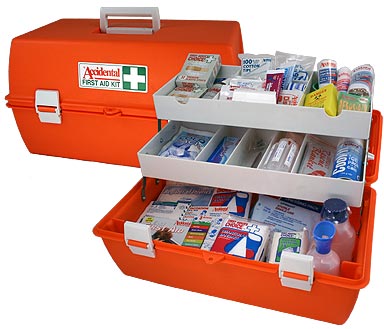 First aiders: Review new ANSI standard on
first aid kits
First aiders: Review new ANSI standard on
first aid kits
OSHA's 2006
Best Practices Guide: Fundamentals of a
Workplace First Aid Program (OSHA
3317-06N) says this about first aid
supplies:"The supplies must be adequate,
should reflect the kinds of injuries that
occur, and must be stored in an area where
they are readily available for emergency
access. An automated external defibrillator
(AED) should be considered when selecting
first aid supplies and equipment.
"A specific example of the minimal contents
of a workplace first aid kit is described in
American National Standards Institute ANSI
Z308.1 - 2003, Minimum Requirements for
Workplace First Aid Kits. The kits described
are suitable for small businesses. For large
operations, employers should determine how
many first aid kits are needed, and if it is
appropriate to augment the kits with
additional first aid equipment and
supplies."
The International Safety Equipment
Association (IESA) has recently revised
the standard. The updated ANSI/ISEA
Z308.1-2009 includes the designation of new
kit types, expands the required supply list
to include a first aid guide, and redesigns
the product label to be used on kits. The
product label draws attention to the fact
that additional supplies may be needed to
address the unique situations in each
workplace.
Please contact a vendor of your choice for
more on an updated first aid kit.
|
Use case studies to show the need to
follow safe forklift operating rules

The injury
and fatality described in the following OSHA
accident investigation reports could have
been prevented by following safe forklift
operating procedures...
Falling from an order picker
This accident could have easily caused the
worker's death. An employee was operating an
order picker truck in the warehouse of a
printing paper wholesaler in July 2005. He
was working at a height of 13 feet on the
truck's elevated platform. The mast of an
approaching forklift hit the forks
supporting the order picker's platform. The
employee was knocked to the floor and
sustained a cut to his head. Following safe
operating rules and the truck manufacturer's
recommendations to use personal fall arrest
equipment would have prevented this injury.
Obstructed
view causes fatality
In July 2005, an employee at a sawmill was
sweeping the floor when he was hit by a
forklift. The load on the forklift
obstructed the operator's view. The victim
died from an injury to his chest. Forklift
operators must have a clear view of the path
of travel. A spotter in a safe location
should help the operator maneuver the truck
if his view is obstructed.
See Related
Article - February 2007
Pedestrians Lose in forklift incidents
|
Prepare Employees to Work in Hot
Conditions
Anyone who lives in a cold
climate looks forward to hot summer days,
but the heat comes with a price: heat
stress.
This article highlights the heat stress
rules for outdoor workers in Washington and
California, but heat stress can strike
anywhere. In addition to outdoor workers,
people who work in foundries, glass or
ceramic plants, laundries, mines, bakeries,
etc. are exposed to high heat on a regular
basis.
OSHA doesn't have a standard on heat stress,
but the general duty clause (section 5(a)(1)
of the OSH Act of 1970) would apply: "Each
employer shall furnish to each of his
employees employment and a place of
employment which are free from recognized
hazards that are causing or are likely to
cause death or serious physical harm to his
employees." The agency advises employers to
provide workers with water and regular rest
periods in a cool recovery area.
How much heat is too much?
That depends on many variables. The
American Conference of Governmental
Industrial Hygienists (ACGIH) has
established Threshold Limit Values® (TLV®)
for heat stress and heat strain that combine
the work/rest regimen, work load levels, and
clothing considerations to arrive at a safe
wet-bulb globe temperature (WBGT) index
value for the job. An industrial hygienist
would be able to help you evaluate the heat
stress exposures in your workplace.
Another type of heat
evaluation system has been developed by the
National Weather Service to warn the public
about heat emergencies. The
Heat Index gives an indication of how
hot it feels when relative humidity is
considered along with air temperatures. The
National Weather Service issues heat alerts
based on the Heat Index, the local climate,
and the expected duration of the heat.
It's a good idea for
employees to be aware of the hazards and
your organization's policies for working in
hot conditions. According to the
National Institute for Occupational Safety
and Health (NIOSH), employers should
provide training to workers so they
understand what heat stress is, how it
affects their health and safety, and how it
can be prevented. NIOSH also recommends that
employers should:
- Schedule hot jobs for
the cooler part of the day,
- Acclimatize workers
by exposing them for progressively
longer periods to hot work environments,
- Reduce the physical
demands of workers,
- Use relief workers or
assign extra workers for physically
demanding jobs,
- Provide cool water or
liquids to workers,
- Provide rest periods
with water breaks,
- Provide cool areas
for use during break periods,
- Monitor workers who
are at risk of heat stress, and
- Provide heat stress
training
|
2009
James Howell Memorial Safety Award
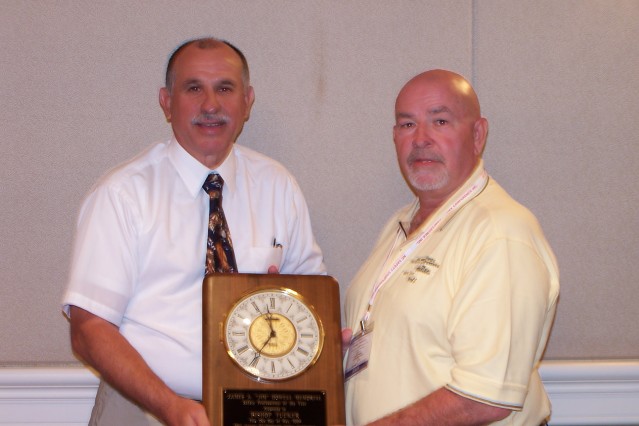
We are pleased to announce that Mr. Bishop
Tucker, Eastern Carolina Safety Council
member since 1974, is the 2009 James Howell
Memorial Safety Award winner.
Bishop is a long time Board member of ECSC.
He has been a dedicated supporter of the
N.C. Industrial Commission Safety Education
Section, NC Stafey Conference and the
Eastern Carolina Safety Council. Bishop a is
very active safety professional and a strong
community and church leader. Mr. Tucker is
employed at Bridgestone/Firestone in Wilson,
NC
|
2009 H.S."Shine" Baucom Award
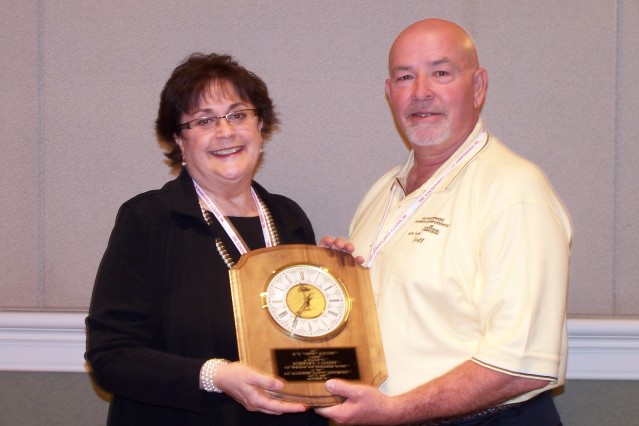
Ms. Barbara Cassidy, Central Piedmont Safety
Council Vice-Chair, was awarded the H.S
"Shine" Baucom award for her dedication and
hard work at the 79th Statewide Safety
Conference. Barbara is the Safety/Loss
Control Analyst with the Forsyth County Risk
Management in Winston-Salem, NC.
This award recognizes and honors the
individual who devotes time, energy,
expertise, and other resources to
achieving Conference goals of making
the workplaces safer for North
Carolina employees.
|
|
About N.C. Industrial Commission
Safety Section
The N.C. Industrial
Commission Safety Education Section stands
ready to assist you with your Safety
training needs. We offer a variety of
courses, designed to suit your needs. Please
give one of our Industrial Safety
Representatives a call.
 DENNIS
PARNELL DENNIS
PARNELL
Director Safety Education
919-218-3000-Cell
919-807-2602
Dennis.Parnell@ic.nc.gov
 KIM
NADEAU
Program Assistant
919-807-2603
919-218-9049-Cell
Kim.Nadeau@ic.nc.gov
 RANDY
CRANFILL RANDY
CRANFILL
Western Carolina Area & APCAP & APW
Coordinator
919-218-2986
Randy.Cranfill@ic.nc.gov
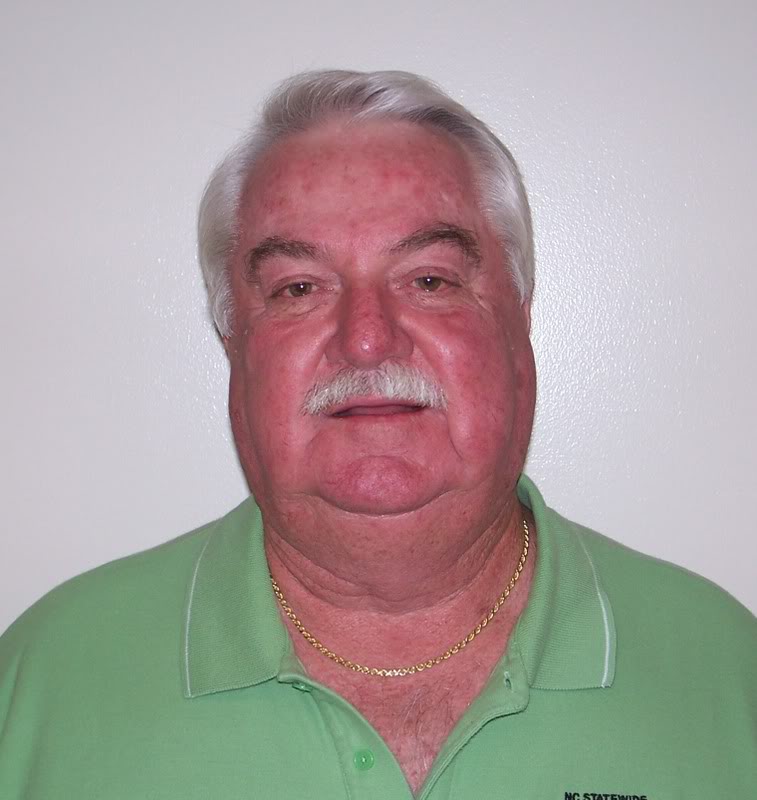 ALVIN
SCOTT ALVIN
SCOTT
Eastern & Northeastern Areas, Eastern
Defensive Driving Instructor
919-218-2792
Alvin.Scott@ic.nc.gov
WE ARE WORKING FOR YOU!
|
|
|
|
Quick Links
VIDEO
Just
Bragging...
Over 540,000 miles and going!
|
|
Quick Links
Construction
Back to Basics
|
|
Quick Links
General
Industry
Avoiding
Common Office Injuries
|
|
Quick Links
Fleet Safety
Keeping your seat belts safe
|
|
Quick Links
CENTRAL
PIEDMONT SAFETY COUNCIL
Membership
Brochure
|
|
Quick Links
EASTERN
CAROLINA SAFETY COUNCIL
Membership
Brochure
|
|
Quick Links
SOUTHEASTERN SAFETY COUNCIL
Membership
Brochure
|
|
Quick Links
WESTERN
PIEDMONT SAFETY COUNCIL
Membership
Brochure
|
|
Quick Links
MID-STATE
SAFETY COUNCIL
Membership
Brochure
|
|
Quick Links
BLUE RIDGE SAFETY COUNCIL
Membership Brochure
|
|
Quick Links
NORTHEASTERN SAFETY COUNCIL
Membership Brochure
|
|
Quick Links
WESTERN
CAROLINA SAFETY COUNCIL
Membership Brochure
|
|
Quick Links
NC RURAL WATER ASSOCIATION
|
|
Quick Links
SIGN-UP FOR OUR NCIC SAFETY
BULLETIN
Email/Newsletter
|
|